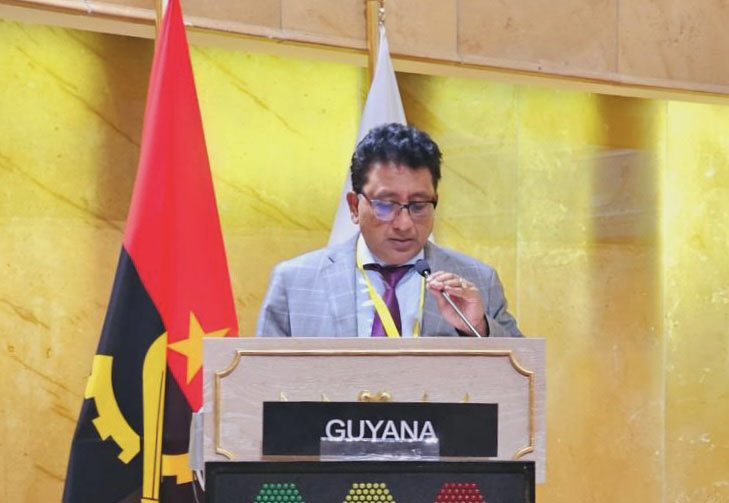Attorney General and Minister of Legal Affairs, Anil Nandlall SC has called on the Inter-Parliamentary Union to condemn the actions of the Republic of Venezuela and demand that Caracas respect the legal processes of the International Court of Justice (ICJ).
A release from the Attorney General’s Chambers/ Ministry of Legal Affairs informed that these remarks were made by the Attorney General yesterday in his address to the Inter-Parliamentary Union (IPU) General Assembly in Luanda, Angola. He invited the assembly to condemn the actions of Venezuela, and demand that Venezuela respects the legal process of the ICJ while declaring that “Time is of the essence.”
Venezuela has engaged in threatening behaviour over the last two months in particular and is pressing for direct talks on the border controversy between the two countries even though the case is now at the ICJ. It also plans to hold a referendum on Guyana’s Essequibo on December 3rd in a move that Georgetown says is tantamount to the annexation of territory.
The Attorney General is part of Guyana’s Parliamentary delegation attending IPU’s 147th Assembly this week in Angola.
According to the release, the IPU is one of the oldest and largest association of Parliaments in the world. It comprises of 180 Parliaments across the globe. The Bahamas was accepted as the 180th member of the Union at the 147th meeting of the Assembly currently taking place in Luanda, Angola under the theme “Parliamentary Action for Peace, Justice and Strongs Institutions”, pursuant to Sustainable Development Goal (SDG)16 of the United Nations.
In his speech, Guyana’s Minister of Legal Affairs addressed the importance of the Rule of Law to Justice and Democracy, noting that the theme of the conference was “most opportune in today’s world.” He posited that for there to be world peace there must be justice. “Here, I speak of legal, social and ecological justice. Justice is guaranteed by the Rule of Law and it is strong institutions that ensure the maintenance of the Rule of Law. The alternative is anarchy, war and human degradation.”
Nandlall also listed what he considered to be the main components of the Rule of Law; a strong legal framework, transparent and accountable governance, vibrant democratic institutions, a robust Parliament, an independent judicial system and, at the global level, compliance with International Law and conventions – “all concatenate as guardians of the Rule of Law and Justice, so essential for universal human progress and social advancement.”
He also underscored that both at home and abroad, it is necessary for public institutions to be adequately resourced, and further, those who man them must discharge their functions “faithfully and fearlessly.” It is only then, he asserted, that they will be able to attract and enjoy public trust and confidence.
The Attorney General then spoke of the need to ensure that those who are elected to form governments, sit in Parliament and appointed to act in public institutions are done so by processes that are lawful, democratic and transparent. He warned that those who attempt to “corrupt and pervert these processes are enemies of human progress and must be dealt with as condignly as possible.”
Nandlall contended that if these basic but yet fundamental requirements are met, the institutions mentioned will in turn ensure and guarantee respect for human rights and freedoms. They will also “swiftly” resolve disputes in accordance with law and fundamental justice. “In short, they will secure the rule of law and deliver human progress.”
The Minister of Legal Affairs also touched on the access and availability of justice to all, stressing that it must not only be available to the rich and the powerful, but be equally available to the poor and the indigent. States have a responsibility, he charged, to not only ensure the availability of institutions of justice far and wide, but to also ensure that citizens have the means to access these institutions. And as part of this availability, he noted, “The justice system itself must not be cumbersome but simple to engage. It must not be a cloistered virtue, but must suffer the scrutiny and fair criticism of the ordinary man.”
The Attorney General also advocated that globally, nation states must comply with International Law, Agreements and Conventions, and must be bound by decisions and processes of international organisations such as the United Nations (UN) and the International Court of Justice (ICJ).
Nandlall then proceeded to connect the theme of the conference to Guyana’s border controversy with Venezuela.
“Much have been said about the war in Ukraine, the conflict in Gaza and conflicts elsewhere. However, I wish to place on the record, a situation which is evolving in my country, Guyana, where the Republic of Venezuela proposes to pass a referendum in that country on the 3rd of December, 2023, seeking to annex to Venezuela, more than two thirds of Guyana’s sovereign territory. This reckless and unlawful move is intended to further Venezuela’s baseless claim to Guyana’s territory – a dispute long settled by Arbitration in 1899. Venezuela perseveres with this illegal conduct despite that this issue is pending between the two States at the International Court of Justice upon the direction of the UN Secretary General. Actions like these not only undermine public institutions, but engender conflicts and violate the very thematic fundamentals of this conference. In the circumstances I call upon the IPU to condemn the actions of the Republic of Venezuela and demand that Venezuela respect the legal process of the International Court of Justice. Time is of the essence!”
The release noted that the delegates from many countries have expressed their support for and solidarity with Guyana in respect of its border controversy with Venezuela. As such, efforts are underway to have these expressions of support formalised.





